Edie Melson's Blog, page 92
April 15, 2023
My Prayer for Writers
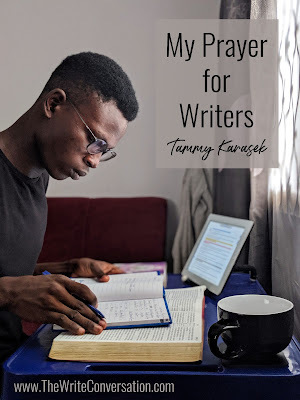
by Tammy Karasek @TickledPinkTam
Christian writers should be praying for our writing. That sounds very simplistic, but am I the only one that often forgets to cover my writing in prayer before I get into a writing jam?
More than I’d like to admit, I sit in front of my computer and start tapping away on my keyboard, then hit a wall. I plead for God to help me get past the block. The thought comes—I should’ve started with prayer rather than turn to prayer now that I’m in a bind. Although, God being God, he meets me there as well. But what if I do what I should do, which is pray first?
I’d like to offer this prayer for all of us writers. May it bless you in your writing.
Lord, help us to:
Write the words you want us to share. You’ve called us to this mission, please guide us to the message you’ve chosen specifically for us to deliver. Read scripture so we may stay grounded in you. May your words wash over us and remain in us as we write. Invest in our craft of writing. Help guide us to the proper conferences, workshops and books grow stronger in our writing. Treat our writing as a blessing not a drudgery. Remind us that you called us to this and we can trust you’ll equip us for the task at hand. Exude the love of Christ in our words and actions to others and especially to our writer friends who may succeed quicker than we do. Remember we all start with the same blank page that’s waiting for us to add words to it. Nobody has a secret on how to skip that first empty page with the blinking cursor staring at you.Say a prayer of gratitude for the gift you’ve given us to encourage, teach and inspire others through our written words. In Christ, I offer this prayer for my writing friends as well as myself. Amen.
What about you? Do you remember to pray before you begin your writing session?
TWEETABLEMy Prayer for Writers from Tammy Karasek, @TickledPinkTam on @EdieMelson (Click to Tweet)
 Tammy Karasek uses humor and wit to bring joy and hope to every aspect in life. Her past, filled with bullying and criticism from family, drives her passion to encourage and inspire others and give them The Reason to smile. She’s gone from down and defeated to living a “Tickled Pink” life as she believes there’s always a giggle wanting to come out!
Tammy Karasek uses humor and wit to bring joy and hope to every aspect in life. Her past, filled with bullying and criticism from family, drives her passion to encourage and inspire others and give them The Reason to smile. She’s gone from down and defeated to living a “Tickled Pink” life as she believes there’s always a giggle wanting to come out! When not writing Rom-Com, she’s The Launch Team Geek helping authors launch their books and also a Virtual Assistant for a couple best-selling authors. Her work was published in a Divine Moments Compilation Book—Cool-inary Moments. She’s also the Social Media Manager for the Blue Ridge Mountains Christian Writers Conference, Founding President and current Vice-President of ACFW Upstate SC, and Founding President of Word Weavers Upstate SC. She’s a writing team member for The Write Conversation Blog, Novel Academy, MBT Monday Devotions, The Write Editing and others. Connect with Tammy at HTTPS://WWW.TAMMYKARASEK.COM.
Featured Image: Photo by Oladimeji Ajegbile on Unsplash
Published on April 15, 2023 22:00
April 14, 2023
Lessons Learned During a Year Without Writing
Edie here. I'm super excited today to introduce you to our newest columnist—Patty Smith Hall. I've been a big fan of hers for a long time and I know she's going to be a great addition to our community! Be sure to give her a big TWC Welcome!
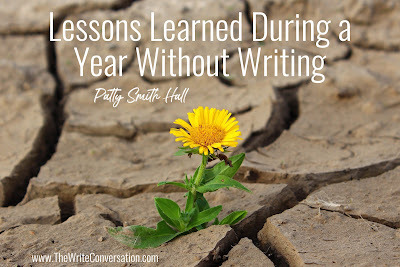
A Year Without Writingby Patty Smith Hall @PattySmithHall
But during the seventh year the land shall have a Sabbath rest, a Sabbath to the Lord; you shall not sow your field nor prune your vineyard. Leviticus 25:4
Last June, I was on the brink of exhaustion. A tight deadline (two novellas and a full-length novel in six months) had pushed me over the edge. I’d lost weight and suffered from anemia after months of working from early morning to late at night, sometimes forgetting to eat. On top of that, I helped my dad take care of my mom who suffers from dementia and cared for our home. My plate was full. My husband, Danny pushed me to take a few months off before diving into my next book, but I rejected the idea. After all, you’re only as good as your last book. If I walked away from writing for six months as he suggested, I feared my readers would lose interest and move on. A sabbatical wasn’t a smart move.
But God had other plans for me.
A series of events forced me to take a sabbatical from my writing. We lost a grandchild to miscarriage. Our oldest grandson was misdiagnosed with cancer. My mother’s condition worsened. My focus this year has been on family and friends, of building back relationships I’d put on the back burner while I was on deadline (which was constantly over the past twelve years.) I also focused on leaning into God during this difficult season. I was right where I needed to be, and that didn’t include writing.
Here are some of the things I learned during my ‘fallow’ season:
1. It’s biblical to take a sabbatical. The word sabbatical comes from the word sabbath which is a day of rest devoted to God. A sabbatical is just several sabbaths linked together to totally devote yourself to resting and listening to God’s voice. Most times, we become so busy that the busyness drowns out that still, small Voice so we stop listening. We depend on our own plans rather than let God reveal His for us. A sabbatical allows you to slow down and really focus on your relationship with God.
2. Writing is a gift from God. Due to contracts and deadlines, I’ve been writing non-stop for the last twelve years. After I finished my last book, something frightening happened. Overnight, my desire to write vanished. It felt like God Himself had commanded it. For someone who started a novella the morning after major surgery, this was scary. The first month, I puttered around my house, not sure of what to do. Then, I started doing things I’d put off until later. I learned how to crochet. I cleaned out our basement. All the while, I’d have the running conversations with the Lord. Three months in, the thought of writing didn’t seem so scary anymore. Now, I see writing for what it truly is: a gift from God. If He allows me to write again, I’ll rejoice in it. If my desire to write never returns, I’ll rejoice in that too.
3. A sabbatical from writing doesn’t mean you can’t study the craft. For the first time, I had time to listen to podcasts on marketing the books I’ve already written. I took classes on blogging and read so many books, my eyes gave out. I learned a lot about the publishing industry, and that knowledge helped me formulate a plan for the next chapter in this journey if God allows me to continue writing.
4. My writing feels different. While I’m not in novel-writing mode, I have written some devotionals and articles that are different from anything else I’ve ever written. In the past, my novels and novellas have been light-hearted, something to brighten a dull day. Now, there’s a vulnerability to my work that wasn’t there before. It rolls out of me unforced like a natural extension of myself. I realized it had not been allowed to develop in the fury of deadlines and contracts but this year, it’s bloomed with rest and time.
As I near the one-year mark of my sabbatical, I already feel the creative juices flowing again. Ideas for new books and the thought of writing excite me again. Now, I’m working on a work/life balance that gives me the opportunity to live my life more fully, always remembering my gift of writing is His alone.
TWEETABLELessons Learned During a Year Without Writing from author @PattySmithHall on @EdieMelson (Click to Tweet)
 Patty Smith Hall is a multi-published author, teacher and encourager to new writers just starting their journey. A founding member of ACFW, she served on the national board and as a Genesis contest coordinator, and presided as president of her local chapter. As an acquisition editor for Winged Publications, she finds great joy in helping and encouraging others reach their publishing dreams. Married almost 40 years to Danny, she finds great joy in her family, friends, and her relationship with Jesus Christ. You can contact her at www.pattysmithhall.com.
Patty Smith Hall is a multi-published author, teacher and encourager to new writers just starting their journey. A founding member of ACFW, she served on the national board and as a Genesis contest coordinator, and presided as president of her local chapter. As an acquisition editor for Winged Publications, she finds great joy in helping and encouraging others reach their publishing dreams. Married almost 40 years to Danny, she finds great joy in her family, friends, and her relationship with Jesus Christ. You can contact her at www.pattysmithhall.com.

A Year Without Writingby Patty Smith Hall @PattySmithHall
But during the seventh year the land shall have a Sabbath rest, a Sabbath to the Lord; you shall not sow your field nor prune your vineyard. Leviticus 25:4
Last June, I was on the brink of exhaustion. A tight deadline (two novellas and a full-length novel in six months) had pushed me over the edge. I’d lost weight and suffered from anemia after months of working from early morning to late at night, sometimes forgetting to eat. On top of that, I helped my dad take care of my mom who suffers from dementia and cared for our home. My plate was full. My husband, Danny pushed me to take a few months off before diving into my next book, but I rejected the idea. After all, you’re only as good as your last book. If I walked away from writing for six months as he suggested, I feared my readers would lose interest and move on. A sabbatical wasn’t a smart move.
But God had other plans for me.
A series of events forced me to take a sabbatical from my writing. We lost a grandchild to miscarriage. Our oldest grandson was misdiagnosed with cancer. My mother’s condition worsened. My focus this year has been on family and friends, of building back relationships I’d put on the back burner while I was on deadline (which was constantly over the past twelve years.) I also focused on leaning into God during this difficult season. I was right where I needed to be, and that didn’t include writing.
Here are some of the things I learned during my ‘fallow’ season:
1. It’s biblical to take a sabbatical. The word sabbatical comes from the word sabbath which is a day of rest devoted to God. A sabbatical is just several sabbaths linked together to totally devote yourself to resting and listening to God’s voice. Most times, we become so busy that the busyness drowns out that still, small Voice so we stop listening. We depend on our own plans rather than let God reveal His for us. A sabbatical allows you to slow down and really focus on your relationship with God.
2. Writing is a gift from God. Due to contracts and deadlines, I’ve been writing non-stop for the last twelve years. After I finished my last book, something frightening happened. Overnight, my desire to write vanished. It felt like God Himself had commanded it. For someone who started a novella the morning after major surgery, this was scary. The first month, I puttered around my house, not sure of what to do. Then, I started doing things I’d put off until later. I learned how to crochet. I cleaned out our basement. All the while, I’d have the running conversations with the Lord. Three months in, the thought of writing didn’t seem so scary anymore. Now, I see writing for what it truly is: a gift from God. If He allows me to write again, I’ll rejoice in it. If my desire to write never returns, I’ll rejoice in that too.
3. A sabbatical from writing doesn’t mean you can’t study the craft. For the first time, I had time to listen to podcasts on marketing the books I’ve already written. I took classes on blogging and read so many books, my eyes gave out. I learned a lot about the publishing industry, and that knowledge helped me formulate a plan for the next chapter in this journey if God allows me to continue writing.
4. My writing feels different. While I’m not in novel-writing mode, I have written some devotionals and articles that are different from anything else I’ve ever written. In the past, my novels and novellas have been light-hearted, something to brighten a dull day. Now, there’s a vulnerability to my work that wasn’t there before. It rolls out of me unforced like a natural extension of myself. I realized it had not been allowed to develop in the fury of deadlines and contracts but this year, it’s bloomed with rest and time.
As I near the one-year mark of my sabbatical, I already feel the creative juices flowing again. Ideas for new books and the thought of writing excite me again. Now, I’m working on a work/life balance that gives me the opportunity to live my life more fully, always remembering my gift of writing is His alone.
TWEETABLELessons Learned During a Year Without Writing from author @PattySmithHall on @EdieMelson (Click to Tweet)
 Patty Smith Hall is a multi-published author, teacher and encourager to new writers just starting their journey. A founding member of ACFW, she served on the national board and as a Genesis contest coordinator, and presided as president of her local chapter. As an acquisition editor for Winged Publications, she finds great joy in helping and encouraging others reach their publishing dreams. Married almost 40 years to Danny, she finds great joy in her family, friends, and her relationship with Jesus Christ. You can contact her at www.pattysmithhall.com.
Patty Smith Hall is a multi-published author, teacher and encourager to new writers just starting their journey. A founding member of ACFW, she served on the national board and as a Genesis contest coordinator, and presided as president of her local chapter. As an acquisition editor for Winged Publications, she finds great joy in helping and encouraging others reach their publishing dreams. Married almost 40 years to Danny, she finds great joy in her family, friends, and her relationship with Jesus Christ. You can contact her at www.pattysmithhall.com.
Published on April 14, 2023 22:00
April 13, 2023
Why All Writers Need to Avoid the Mistake of Over Writing
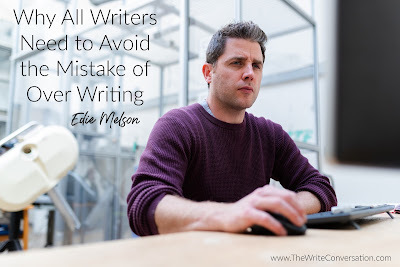
by Edie Melson @EdieMelson
If we look at writing from a numbers point of view, it would be logical to assume that the more words, the better. But writing is NOT a numbers sport, and over writing is the mark of a lazy writer.
It's also something we all do, especially in a first draft. There's nothing wrong with that—as long as we take the time to go back and rework what we've written.
Myth:The more words the better. Some of the great writers of all time come to mind to support this myth—can anyone say Charles Dickens? But one thing people forget about this great author is he made his living writing serials for a newspaper. Keeping the story going, kept the paycheck coming. Don’t get me wrong, I think Charles Dickens was a genius writer. But his era was very different from ours. Wise writers take that into consideration before using him as an example to be long-winded.
Fact:It takes more work and more skill to use fewer words to convey the same meaning.
Just in case you’re not convinced, here’s a real-life example. It’s from an article I sold to a home improvement website.
Avoid Over Writing Articles
Long-winded version: An epoxy floor covering for the garage can be a really good thing. It can increase the value of your home and make keeping the garage clean and organized easy. But there are downsides to this option.
We have all gotten the advice that doing something right the first time is the best way. This saying is definitely true when it comes to applying an epoxy floor covering to the garage. When the epoxy floor covering is applied by a qualified professional it can last a lifetime. But if you don’t find a quality product, and a qualified installer the outcome of this project can end up costing you cash instead of saving you. This article will give you everything you need to make the best decision when it comes to adding an epoxy finish to your garage. (138 words)
Tightened version: We’ve all heard the axiom, “Do it right the first time.” This was never more true than when it’s applied to epoxy flooring for the garage. This floor covering can last a lifetime, when applied by a qualified professional. Or it can last less than a year, if you chose the wrong product and installer. We’ll give you all the information you need to make an informed decision. (68 words)
Because of space constraints, the word count was absolute. I had to deliver an informative article in 420 words or less. That meant I had to cut everything that wasn’t absolutely necessary.
What had to go (and why): In the long-winded version of the article, I have a nice lead-in paragraph. It’s not bad, but it’s also not necessary. The tight version manages to give the same information in just under half the word count.
In the long-winded version of the article, there are also lots of repeated words. Not only is this sloppy writing, but it’s also irritating to read.
Tightening up an article is one thing, but what about fiction?
Avoid Over Writing Fiction
The same principles hold true. It's never a good idea to slow down a good story with unneeded verbiage. Here’s an example from a scene I wrote for a cozy mystery:
Long-winded version: She got out of bed and paced around the room, taking deep breaths and willing her heart rate to slow. She’d read somewhere it helped with panic attacks, but it certainly wasn’t doing her any good. Glancing down at the phone still in her hand, her finger shook as it scrolled through previous calls. Her pacing slowed to a stop in the middle of the room. This couldn’t be right. None of the numbers were familiar. (76 words)
Tightened version: She got out of bed and paced the room, taking deep breaths and willing her heart rate to slow. She’d read somewhere it helped with panic attacks, but it certainly wasn’t doing her any good. Her finger shook as it scrolled though previous calls. Her pacing stopped. This couldn’t be right. None of the numbers were familiar. (57 words)
What had to go (and why): In the long-winded version there are several phrases that could be cut because her actions implied them.
Pacing implies around the room. No one can pace in one place.
Her Finger shook as it scrolled through previous calls implies she was glancing down at the phone still in her hand. She's got to be looking at the phone to do this.
In the long-winded version, I slowed down the action in a tense scene with the phrase, her pacing slowed to a stop in the middle of the room. It's much stronger to just say, her pacing stopped.
As you can see, no matter what you're writing brevity is pure gold. Take time to go back over your words, evaluate the effectiveness of each one and keep only the ones you need.
How about you? Are there any redundant phrases you see in books or articles that irritate you?
Don't forget to join the conversation!Blessings,Edie
TWEETABLEWhy All Writers Need to Avoid the Mistake of Over Writing from @EdieMelson (Click to Tweet)
 Edie Melson is a woman of faith with ink-stained fingers observing life through her camera lens. She’s a writer who feels lost without that device & an unexpected speaker who loves to encourage an audience. She also embraces the ultimate contradiction of being an organized creative. She knows the necessity of Soul Care and leads retreats, conferences & workshops around the world on staying connected to God. Her numerous books, including the award-winning Soul Careseries & reflect her passion to help others develop the strength of their God-given gifts. Her blog, The Write Conversation is recognized as one of the top 101 industry resources.
Edie Melson is a woman of faith with ink-stained fingers observing life through her camera lens. She’s a writer who feels lost without that device & an unexpected speaker who loves to encourage an audience. She also embraces the ultimate contradiction of being an organized creative. She knows the necessity of Soul Care and leads retreats, conferences & workshops around the world on staying connected to God. Her numerous books, including the award-winning Soul Careseries & reflect her passion to help others develop the strength of their God-given gifts. Her blog, The Write Conversation is recognized as one of the top 101 industry resources. She and husband Kirk have been married 40+ years and raised three sons. They live in the foothills of the Blue Ridge Mountains and can often be found hiking—with Edie clinging to the edge of a precipice for the perfect camera angle and Kirk patiently carrying her camera bag and tripod. Connect with her on her website, www.EdieMelson.com and through social media.
Featured Image: Photo by ThisisEngineering RAEng on Unsplash
Published on April 13, 2023 22:00
April 12, 2023
Celebrate a Writing Contract with a BookMoon

by Julie Lavender @JLavenderWrites
Someone in a younger generation than I currently reside in coined the term “babymoon” to mean one last vacation as a couple before a new baby comes along. Not to be outdone—because I like making up new words, too—I decided after a recent contract signing that my husband and I would take one last trip before I put “butt in chair” to meet deadlines, and I would call said trip: bookmoon.
My newest contract, a mom’s devo for Penguin Random House, comes with a head-spinningly quick deadline—I think that may be a new adverb I just created too, because I can see a red line under the word—so I knew once the book details arrived in my inbox, I’d have very little free time for anything or anyone. I wanted to deposit some hours into my husband’s attention account before I started the writing project, in case he needed to withdraw some fond memories during my busy time of writing.
Don’t get me wrong—my husband is incredibly supportive of my writing opportunities and helps me meet deadlines by taking on even more responsibilities around our home, in addition to his own busy work schedule requirements. But, I like having memories of time spent together in my storage bank as well.
After signing my contract, but waiting for final book instructions, my husband and I packed for a one-night getaway to Jacksonville, Florida. We found a new restaurant to enjoy for lunch, and then headed to the Jacksonville Arboretum and Botanical Gardens. David and I spent hours wandering the trails, listening for birds, counting squirrels, identifying trees and plants, watching for alligators, attempting a few selfies, and stealing kisses.
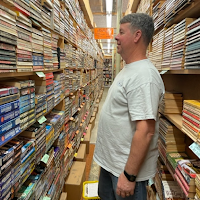 The next day, David and I went different directions … sort of. My “treats” for the trip were exploring the nature center the previous day and picking the restaurants, and David’s treat of choice was hours spent in a ginormous used book store (yeah, that synonym for large has a red line under it, too, but I can’t take credit for making up that word). I eventually made my foray into the cavernous building, but my first priority for the day was my Word Weavers International critique group meeting. My group, Page 33, meets the third Monday of each month. I sat in the car, windows rolled down, computer turned up, and chatted with my girlfriends, using the WW sandwich method, about our most recent writing sample.
The next day, David and I went different directions … sort of. My “treats” for the trip were exploring the nature center the previous day and picking the restaurants, and David’s treat of choice was hours spent in a ginormous used book store (yeah, that synonym for large has a red line under it, too, but I can’t take credit for making up that word). I eventually made my foray into the cavernous building, but my first priority for the day was my Word Weavers International critique group meeting. My group, Page 33, meets the third Monday of each month. I sat in the car, windows rolled down, computer turned up, and chatted with my girlfriends, using the WW sandwich method, about our most recent writing sample.A belated lunch of barbecue and an ice cream dessert later and David and I made our way back to Statesboro, reminiscing past vacations and sharing future dreams and goals. A brief getaway, the trip proved to be just what we needed in preparation for my impending, busy writing schedule.
What about you? Have you ever taken a BookMoon? And, honestly, if we’re creating our own definitions of words here, we could even designate two definitions for “bookmoon,” one of which means a getaway taken just before starting a new book project OR a getaway taken to celebrate the completion of a book project. Would that change your answer?
Tell me about your bookmoon adventures, ones you’ve already taken or one you’re planning right now in your head! Because I hope I’ll have the blessing of another bookmoon opportunity, and I might want to follow your suggestions!
TWEETABLECelebrate a Writing Contract with a BookMoon from @JLavenderWrites on @EdieMelson (Click to Tweet)
 Julie Lavender loves seeing different parts of God’s big, beautiful world, whether those locations are just a few miles away, across state lines, or across the world. She especially loves adventures with her husband of almost-forty years, and bonus points if her adult kiddos and grandson accompany them. Julie is the author of Children’s Bible Stories for Bedtime(Penguin Random House), 365 Ways to Love Your Child: Turning Little Moments into Lasting Memories (Revell/Baker), and a plethora—she didn’t make that word up but loves to use it often—of newspaper and magazine articles.
Julie Lavender loves seeing different parts of God’s big, beautiful world, whether those locations are just a few miles away, across state lines, or across the world. She especially loves adventures with her husband of almost-forty years, and bonus points if her adult kiddos and grandson accompany them. Julie is the author of Children’s Bible Stories for Bedtime(Penguin Random House), 365 Ways to Love Your Child: Turning Little Moments into Lasting Memories (Revell/Baker), and a plethora—she didn’t make that word up but loves to use it often—of newspaper and magazine articles.
Published on April 12, 2023 22:00
April 11, 2023
What is Ghostwriting and How to Get Started
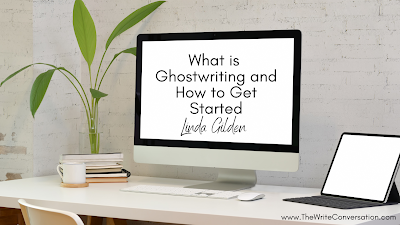
by Linda Gilden @LindaGilden
My first book over 20 years ago was a ghostwritten book. I really didn’t set out to write a ghostwritten book. I loved writing articles and wrote constantly every day. I was working as a writer for a national sports ministry and the founder of the ministry wanted to write a book. I had held off writing a book myself. Writing articles was my main focus and I was very content just writing articles for magazines and the ministry which included writing devotions, a soccer handbook, parenting materials, and other pieces.
One day the founder came to me and said, “I really want to get my book written, cause I’m already thinking about the next one. I already have a publisher and am just now getting around to talking to you about it.”
“You know I have never written a book?”
“I know, but I like the way you write. I feel like your writing is me talking. I want you to do it.” That night I went home and prayed and tried to learn everything I could about ghostwriting. I had to start at the very beginning. But one of the perks of the job was that the publisher sent one of their top editors to my home town to spend two or three days going through the book word by word. It was such a wonderful learning experience and had amazing benefits to my writing career.
Basic Information about Ghostwriting
1. What is ghostwriting? Just like the name implies, ghostwriting is a job written by a writer who is sometimes called the “ghost.” The meaning is because the actual writer behind the scenes is the ghost. The writer’s name that is listed on the front of the book is not actually the writer but the one who hired the ghostwriter. The author is the one who wrote the book through a ghostwriter. The author in most cases didn’t write any of the copy. But the author (whose story it is) makes the decision whether or not he/she wants others to know who actually wrote the book. Some authors want to give credit to the writer and the cover will read “Bill Smith with Gresham Showalter.” Ghostwriters can be hired to write books, book proposals, newsletters, speeches, and other things. Rarely do you have a ghostwriter for fiction works.
2. How do you start working as a ghostwriter? First, you need to meet with your client and make sure you will be able to work together. Get to know each other well enough you know your personalities are compatible so you will not spend time in disagreement over any part of the book. You want someone you can trust.
Once you establish you can work together, it is time to talk about what kind of investment this book will be for the author. Most ghostwritten projects are written for a flat rate, which means that there is a set amount for the work you are going to do according to how big a job you are asked to do. You need to decide what your fee is for the type and length of book you are going to write for them. Some people want to pay in installments so you should be prepared for that. If your client wants to be involved in the writing of the book, that becomes a coaching position and adjustments have to be made for that. Some people are looking for a Developmental Editor instead of a ghostwriter They just don’t know the terminology.
3. What about a schedule? Obviously you will have to spend some time together so it will be helpful to have a schedule to work from. Remember to keep it flexible at the same time honoring the fact it is a “real” appointment. Help your client to understand the way you like to work and how he or she would like to work and take both into consideration. For most ghostwriting projects it is like to begin the project without out some material from your client. As the author, always remember to tape your sessions, with the client’s permissions, of course. Let him or her know that they will only be used as a resource for your writing. You will be surprised how much they will help you. Once you get started you may want to change the frequency of your meetings.
4. Ghostwriting can be fun and an excellent way to add more income. Since my first ghostwritten project God has taken me on a journey through ghostwriting for publishers and individuals. Everyone wants a book and if they can get it without having to write a word themselves, that’s even better, especially when money is no object. Most ghostwriting clients will want help organizing their thoughts and finding spots that are unclear in their stories.
Remember that first book I ghostwrote? Not long after that, I was asked to write the soccer handbook. I had no idea what soccer was all about. I tried to at least know which way our child was supposed to go with the ball. But other than that, it was difficult to learn. So every afternoon my son’s friends who played high school soccer stopped by our house on their way home. “What are we writing about,” they asked.
I rose from my computer and said, “Today I am working on instep kick.” The boys got one on either side of me held on to my elbow (Yes, like a little old lady!) and practiced the kick I was writing on. That gave me so much more understanding. It was a fun hour and none of them have forgotten teaching me soccer kicks in the middle of our den!
If you have specific questions, please feel free to put them in the comments and we can explore them together. There is so much more to learn about ghostwriting.
TWEETABLEWhat is Ghostwriting and How to Get Started, from @LindaGilden on @EdieMelson (Click to Tweet)
 Linda Gilden has coauthored 11 books with 5 different coauthors, with #12 and #13 debuting in 2022, adding a new co-author to the list. She loves every one of her coauthors and enjoys collaborating on interesting projects with them. She also has written many books on her own and realizes what a treasure and blessing a good co-author is.
Linda Gilden has coauthored 11 books with 5 different coauthors, with #12 and #13 debuting in 2022, adding a new co-author to the list. She loves every one of her coauthors and enjoys collaborating on interesting projects with them. She also has written many books on her own and realizes what a treasure and blessing a good co-author is.
Published on April 11, 2023 22:00
April 10, 2023
Tips to Find Your Writing Voice - Learning to be You on the Page

by Cindy K Sproles @CindyDevoted
My first conference I distinctly remember two things: Find your voiceDon't write literary
Keep in mind that this was the bigger part of 22 years ago, but for those two things to have remained with me so long proves words are powerful. I had no idea what find your voice meant. I thought I had one when I spoke. Nor did I understand what everyone meant by don't write literary . It took time to find someone who could give me a snapshot of those things so I could understand.
Let's address the not-so-important advice first. Don't write literary . All I care to say about this phrase is that publishing is trendy. Styles have changed over the years. When I began to write, literary writing was a style that was not trending—that is enough said on that for now.
But the voice—now that's a different bird and one that I think we make out to be more complicated than it really is. Of course, voice is not our speaking voice. Instead, it is our tone on the page. Your writing voice consists of several intricate parts, but first and foremost, it is who you are. Your voice is YOU.
It is the way you phrase sentences. Dilect you use. It's your personality, your movement, and how you express yourself. I said it once before—voice is you on the page.
Often we hear folks talk about finding your voice as if it is some elusive thing when it's not. It is important, but it's not inaccessible. New writers often fall into something I call fancy pants writing. Trust me, this isn't industry terminology, it's purely mine, but it does explain a lot.
New writers tend to write very proper. Stilted and stiff. It's as though they assume they must write like Shakespeare or C. S. Lewis in the back of their minds. Oh, no, no, no. There are two things at play here. First, the writing styles of both Shakespeare and Lewis were different, just like writing types are different today. Those styles were, in essence, their voices. Reading C. S. Lewis, or even Calvin or Luther, though insightful, can be a bit tricky to absorb simply because of the style—or their voices. Their sentences tended to be long and deep. Their vocabulary was stiff and a bit daunting.
I find newer writers have not yet grown past feeling like they need to write prim and proper. This is not bad, but it is something they must learn. As we learn our place in the writing world, our voice begins to develop. We begin to relax, allowing our personality to mix with the ink and drop to the page. The more we write, the more our voice rises to the top.
Our voice is found in our confidence and how we allow it to form sentences, phrases, and thoughts. It's our humor, be it dry or tart. Voice is our mood and the pace we want to set for the reader. As we begin to master that—when we stop trying to write like someone else and realize who we are in this writing world, we can see the value of our voice. By all means, read, read, read. Learn the styles of others, but do not try to be them. Pull from their styles and tweak your own unique voice. Be you.
Perhaps you're a non-fiction writer. It's easy to become very sterile in non-fiction as you write facts and craft books that teach and guide. Still, voice is important. When you allow your voice to relax, when you learn it's okay to use a contraction, then your mood on the page shifts. We still see the teaching, but rather than feeling as though we are trapped in a room with a monotone-speaking professor, we begin to feel and experience the guidance. The teaching becomes relatable. That is voice. It's not something you find in a how-to book. Oh, sure, you can find an explanation, but you can't find your voice. You have to learn to become YOU on the page. Your voice doesn't hide from you. It must be developed.
If you are a fiction writer, your voice is found in your characters, how they speak, phrase sentences, and even their dialect. It's allowing YOU to be expressed through your character's words and movements.
Earlier in my writing career, the amazing Cecil Murphy read one of my fiction books. Honestly, I shook in my boots because I'd heard him repeatedly say that he was not a Christian fiction fan at conferences, yet because of my strong Appalachian voice, Cec liked my books. Everything about my voice shouted Appalachian historical.
Again, voice is not elusive. It's there. You simply must learn to be you on the page. When you do that, you'll find the value in your voice and how it moves your writing to a new level.
TWEETABLETips to Find Your Writing Voice - Learning to be You on the Page from author @CindyDevoted on @EdieMelson (Click to Tweet)
 Cindy K. Sproles is an author, speaker, and conference teacher. Having served for a number of years as a managing editor for Lighthouse Publishing of the Carolinas and Ironstream Media, Cindy now works as a mentor, coach, and freelance editor. She is the co-founder of Writing Right Author Mentoring Services with Lori Marett and she is the director of the Asheville Christian Writers Conference. Cindy is also the co-founder of Christian Devotions Ministries and WWW.CHRISTIANDEVOTIONS.US, as well as WWW.INSPIREAFIRE.COM. Her devotions are in newspapers and magazines nationwide, and her novels have become award-winning best-selling works. She is a popular speaker at conferences and a natural encourager. Cindy is a mountain girl, born and raised in the Appalachian mountains, where she and her husband still reside. She has raised four sons and now resorts to raising chickens where the pecking order is easier to manage. You can visit Cindy at WWW.CINDYSPROLES.COM or www.wramsforwriters.com.
Cindy K. Sproles is an author, speaker, and conference teacher. Having served for a number of years as a managing editor for Lighthouse Publishing of the Carolinas and Ironstream Media, Cindy now works as a mentor, coach, and freelance editor. She is the co-founder of Writing Right Author Mentoring Services with Lori Marett and she is the director of the Asheville Christian Writers Conference. Cindy is also the co-founder of Christian Devotions Ministries and WWW.CHRISTIANDEVOTIONS.US, as well as WWW.INSPIREAFIRE.COM. Her devotions are in newspapers and magazines nationwide, and her novels have become award-winning best-selling works. She is a popular speaker at conferences and a natural encourager. Cindy is a mountain girl, born and raised in the Appalachian mountains, where she and her husband still reside. She has raised four sons and now resorts to raising chickens where the pecking order is easier to manage. You can visit Cindy at WWW.CINDYSPROLES.COM or www.wramsforwriters.com.
Published on April 10, 2023 22:00
April 9, 2023
When Failure as a Writer Brings Blessings
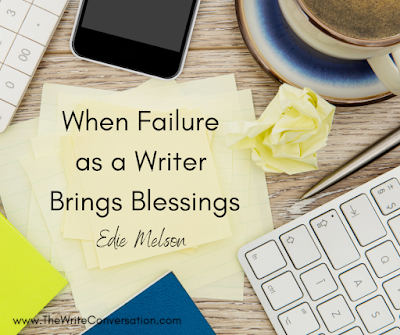
by Edie Melson @EdieMelson
That is why, for Christ’s sake, I delight in weaknesses, in insults, in hardships, in persecutions, in difficulties. For when I am weak, then I am strong (2 Corinthians 12:10 NIV).
For me, failure reinforces and validates the fears I battle as a writer. Every mistake I make seems to add weight to the voices I hear in my head that feed my insecurity. And I make a lot of mistakes. Because this vicious cycle can bring my writing to a screeching halt, I’ve had to find a way to combat this way of looking at life.
One week I was overwhelmed with assignments—blog posts, articles, devotions, and even a book—all due in the same week. Although I’d love to say I was organized and everything went off without a hitch, it didn’t. The book I turned in had all my attention and the other assignments suffered. By the time Friday rolled around I felt like I’d been to war and back—finishing up wounded and weary. I’d been honest on social media about the craziness of the week and how I’d tried to make sure my work was typo-free and on time, but I’d fallen so short it was pathetic, and I knew it.
Truthfully, I felt like quitting that week. Everywhere I turned, the evidence of my failure was on view to the world. I couldn’t see how my less-than-stellar work was blessing anyone. The last straw was the blog post I’d published on my own site that morning. As I read it in the email that had been sent out I just shook my head. The typos and other mistakes seemed to prove my ineptitude.
Tired beyond belief, I pulled up my blog and began the process of fixing the typos and grammar mistakes, wondering how long my readers would put up with my mistakes. How could I encourage, equip and empower other writers when I was such a colossal failure?
That was the day the email arrived in my inbox.
A new writer shared that although it had taken all her courage to write me. But my openness about my struggles and my doubts that week had given her the push she needed. She felt I’d understand her turmoil. She went on to say that the fact I’d fallen short of perfection was an encouragement and was keeping her from quitting on the call God had placed on her life.
She shared her struggles, and I finished the email with tears in my eyes. How like God to show me once again how He was at work through me, no matter how imperfect I was. He reminded me that I wasn’t the one who needed to be perfect. He has that covered—and in His perfection—He makes everything work together exactly as it should.
TWEETABLEWhen Failure as a Writer Brings Blessings from @EdieMelson (Click to Tweet)
*Blog post reprinted and adapted with permission from Soul Care for Writers, Bold Vision Books, August 2019
 Edie Melson is a woman of faith with ink-stained fingers observing life through her camera lens. She’s a writer who feels lost without that device & an unexpected speaker who loves to encourage an audience. She also embraces the ultimate contradiction of being an organized creative. She knows the necessity of Soul Care and leads retreats, conferences & workshops around the world on staying connected to God. Her numerous books, including the award-winning Soul Careseries & reflect her passion to help others develop the strength of their God-given gifts. Her blog, The Write Conversation is recognized as one of the top 101 industry resources.
Edie Melson is a woman of faith with ink-stained fingers observing life through her camera lens. She’s a writer who feels lost without that device & an unexpected speaker who loves to encourage an audience. She also embraces the ultimate contradiction of being an organized creative. She knows the necessity of Soul Care and leads retreats, conferences & workshops around the world on staying connected to God. Her numerous books, including the award-winning Soul Careseries & reflect her passion to help others develop the strength of their God-given gifts. Her blog, The Write Conversation is recognized as one of the top 101 industry resources. She and husband Kirk have been married 40+ years and raised three sons. They live in the foothills of the Blue Ridge Mountains and can often be found hiking—with Edie clinging to the edge of a precipice for the perfect camera angle and Kirk patiently carrying her camera bag and tripod. Connect with her on her website, www.EdieMelson.com and through social media.
Published on April 09, 2023 22:00
April 8, 2023
Writing and Watching Time

by Martin Wiles @LinesFromGod
In every class, I had them. Time watchers.
As I taught the grammar/writing lesson, I watched their eyes dart back and forth like a scared rabbit fleeing from a determined hunter. They looked at me for a few minutes and then at one of my two clocks. The ones who couldn’t tell time by my old-school analog clock hanging on the wall looked at the digital one on my microwave.
I identified with them. I had been a clock watcher since I was young. The difference was that I wasn’t watching the clock because I lacked interest in the subject matter but because I was attempting to teach them as much as possible in forty-five minutes. I also knew the clock watchers would be the first to ask what they should do when I issued the assignment because they weren’t paying attention. Instead, they thought about their elective classes or lunch rather than the grammar and writing principles I taught.
So, one night, when insomnia climbed into bed with me, I thought of a way to teach them a lesson. When I arrived in my classroom the following day, I changed the time on both clocks to random times. Sure enough, curious looks soon emanated from the time watchers.
One student asked, “Did we set the time back last night?” Another asked how much longer before the bell rang. Not thinking, I told her. Since she couldn’t read an analog clock, she memorized where the large hand would be the next day when it was time for the bell. Knowing what she had done, I changed the times again the following day.
My students expect me to aggravate them—and enjoy my classes because of it. On the other hand, my wife said she would have gone home crying every day had I been her teacher. But my aggravation had a point: Don’t focus so much on the time that you fail to listen and act.
A similar problem existed in Thessalonica, and Paul addressed it in his second letter to the church folks there.
“Yet we hear that some of you are living idle lives, refusing to work and meddling in other people’s business” (2 Thessalonians 3:11 NLT).
They so believed Christ would return at any moment that they stopped working. Instead, they sat around all day, which led to meddling in other people’s business.
Perhaps they were unfamiliar with the adage, “An idle mind is the devil’s workshop.” So Paul told them to get busy as they waited. My dad was convinced Christ would return during his lifetime, but he did God’s work while waiting.
As Christian writers, we can easily get caught up in the “what’s the use” attitude, believing our writing won’t change anything or anyone. Or maybe we’re one of the ones Paul corrects.
I’m still a time watcher, but I don’t sit around while I watch, nor am I idle because I don’t enjoy doing what I’m doing. I love writing and editing—among the other things God has given me to do—and I believe using my gifts makes a difference in others’ lives, one person at a time. I’m time conscious because I want to do as much for God as possible in the time he gives me—something I don’t know. And I also know many things can hinder us writers from doing what God has called us to do.
Be a time watcher but watch because you anticipate all God will do through you. And in the meantime, remember:
God, family, and others should be first, not our writing.We must intentionally make time to write.God will use our writing where he desires.We write for an audience of One: God.
God can’t do anything with a blank piece of paper.
TWEETABLEThoughts on Writing and Watching Time from Martin Wiles, @LinesFromGod, on @EdieMelson (Click to Tweet)
 Martin Wiles is the founder of Love Lines from God (WWW.LOVELINESFROMGOD.COM) and serves as Managing Editor for Christian Devotions and Directing Editor for VineWords. He has authored six books and has been published in numerous publications. His most recent book, DON'T JUST LIVE...REALLY LIVE, debuted in October of 2021. He is a freelance editor, English teacher, author, and pastor.
Martin Wiles is the founder of Love Lines from God (WWW.LOVELINESFROMGOD.COM) and serves as Managing Editor for Christian Devotions and Directing Editor for VineWords. He has authored six books and has been published in numerous publications. His most recent book, DON'T JUST LIVE...REALLY LIVE, debuted in October of 2021. He is a freelance editor, English teacher, author, and pastor.
Published on April 08, 2023 22:00
April 7, 2023
Writers, Put Down the Measuring Stick and Rediscover Your Writing Joy

by Beth Vogt @BethVogt
A writer-friend emailed me to say she’d read my 2018 women’s fiction novel, Things I Never Told You. I was happy to hear she loved it. I also appreciated it when she shared several specific passages she liked. And then she ended the email with, “Oh, Beth, if only I could write like you.”
*Blush*
My response?
“Don’t worry about writing like me—it’s hard enough for me to do that.” Then I said, “You write like you.”
The comparison trap is a dangerous thing.
Had my friend truly fallen into the trap of comparison? No. I believe she was offering me a heartfelt compliment. And yet …
Comparison is so sneaky. One minute we’re enjoying another author’s writing. Their way with words. The rhythm and rhyme. The simile and symbolism.
The next moment we’re caught in the snare of comparison, which can lead to the sharp bite of envy—wishing we had what another writer has. Their talentTheir opportunitiesTheir agentTheir publisher Their contractsTheir awards
Comparison undermines our writing relationships. Undermines our creativity. Undermines our productivity because our focus is on them, not us.
Even worse, our focus is on this, that, and all the other—not God.
Let me wrap up this blog with a statement: This likely is not the first post you’ve read about the trap of comparison.
Consider this question: What most easily trips you up into comparing yourself with another writer?
When someone:
1. finals in a contest and you don’t? 2. lands an agent at their first writers conference—It happens!—and you’re still seeking representation after years and years and years of trying? 3. gets a TV interview? 4. is invited to teach a writers workshop?5. signs a contract . . . again?
We need to know our areas of weakness to better defend against measuring our success compared to another writer’s success. Knowing this helps us keep our guard up for a possible comparison trap. We stay confident in who we are, how God made us, and what He has for us.
TWEETABLEWriters, Put Down the Measuring Stick and Rediscover Your Writing Joy, insight from @BethVogt on @EdieMelson (Click to Tweet)
 Beth K. Vogt believes God’s best often waits behind the doors marked “Never.” She’s authored 14 novels and novellas, both romance and women’s fiction. Beth is a Christy Award winner, an ACFW Carol Award winner, and a RITA® finalist. Her novel Things I Never Told You, book one in her Thatcher Sisters Series by Tyndale House Publishers, won the 2109 AWSA Golden Scroll Award for Contemporary Novel of the Year. An established magazine writer and former editor of the leadership magazine for MOPS International, Beth blogs for Learn How to Write a Novel and The Write Conversation and also enjoys speaking to writers group and mentoring other writers. She lives in Colorado with her husband Rob, who has adjusted to discussing the lives of imaginary people. Connect with Beth at bethvogt.com.
Beth K. Vogt believes God’s best often waits behind the doors marked “Never.” She’s authored 14 novels and novellas, both romance and women’s fiction. Beth is a Christy Award winner, an ACFW Carol Award winner, and a RITA® finalist. Her novel Things I Never Told You, book one in her Thatcher Sisters Series by Tyndale House Publishers, won the 2109 AWSA Golden Scroll Award for Contemporary Novel of the Year. An established magazine writer and former editor of the leadership magazine for MOPS International, Beth blogs for Learn How to Write a Novel and The Write Conversation and also enjoys speaking to writers group and mentoring other writers. She lives in Colorado with her husband Rob, who has adjusted to discussing the lives of imaginary people. Connect with Beth at bethvogt.com.
Published on April 07, 2023 22:00
April 6, 2023
Worldbuilding 101 for Writers: Writing Language and Communication

by A.C. Williams @ACW_author
Have you ever just sat in a cafe or restaurant in another country to simply listen? That’s one of my favorite pastimes on international trips. I love to grab a cup of coffee and find a seat in a pub or a coffeeshop and watch people and listen to how they speak and what they say and how they say it. Because, let’s face it, what we say and how we say it communicates a great deal about who we are as a culture (for better or for worse).
You don’t even have to be in a different country. You could do this in your own city. Regional cultures are a thing. Even the districts within a city can be unique in their own way (someday I’ll share about the passionate divide between East and West in my comparatively small city).
Vocabulary, pronunciation, attitude, and body language can express an extraordinary amount of information about a person and what culture shaped them. That’s why language and communication are such valuable tools for developing the storyworld in your novel.
So far in this Worldbuilding 101 series, we’ve talked about Existing History and People and Social Circles. Both of those concepts are essential building blocks of creating a storyworld. (links to previous posts can be found at the end of today's post)
Today we’re going to go a bit deeper into the “People” category and talk about Language and Communication.
If you’ve read any of the PC CHILIDOG character development series, there’s a post about language and idiom that will connect with this concept in worldbuilding. For developing a character, language and idiom is part of who that character is; from the worldbuilding side, language and idiom explains WHY they are that way. Your storyworld should inform how your characters speak, move, and express themselves.
Classic example? Oh, so many. Let’s go with Hercule Poirot. Agatha Christine was a master of understanding human nature, and her famous detective Hercule Poirot is one of the most iconic figures in literature (it’s the mustache). He’s Belgian. So if he doesn’t speak like someone from Belgium, there would be a problem. If he doesn’t behave in a way that is consistent with someone from Belgium, there would be a problem. He is from Belgium, so in order to convince a reader that this is truly the case, he must act like it.
What about in Tolkien’s world? Elves speak Elvish. Dwarves speak Dwarvish. Men speak—what?—Numenorian? Unless they have a reason to speak everything (uh-hem, Aragorn), those languages generally stay within their individual cultures.
I read an article some time ago about a shepherding culture in the mountains somewhere in Europe that communicates by whistling. The distances they have to communicate over are too vast for voices to travel, but whistles work.
I have a friend who spent a summer in Papua New Guinea and realized quickly that a rather large part of their language is non-verbal (like everyone’s language, frankly). But in PNG it’s very much in the face. You can apparently have an entire conversation with your eyebrows.
From personal experience, I can tell you that in Guatemala if you compare someone to an animal, it’s a huge insult. So you can’t say “the kids are behaving like monkeys” or “that guy is strong as an ox” without terribly offending someone. It’s a cultural thing that dates back to the conquistadors.
The language and word choice your characters use must be based on the culture where they originated or where they spent the majority of their time.
Does the culture you’re building favor large families and chaotic meal times? Maybe there should be hand signals for when to pass the salt at dinner.
Does the culture you’re designing only hear certain frequencies of sound? Maybe they need to communicate using colors instead.
Is the world you’re building underwater? That will wreak havoc with spoken communication just in general.
Part of constructing a believable storyworld is making sure that your cultures and characters remain consistent in how they speak to each other.
So if you’ve already got a character who communicates in a specific way, that’s great. Build your world and its forms of communication around what your character already does. Just be sure you can explain it.
If you prefer to start from the ground up, begin with the world. Is it a desert planet that worships giant sandworms? Is it a water planet full of pirates and bounty hunters? Is it an old fashioned train full of passengers with murderous motives? How would people from those worlds communicate with each other? How would they communicate with people from another world?
TWEETABLE
 Award-winning author, A.C. Williams is a coffee-drinking, sushi-eating, story-telling nerd who loves cats, country living, and all things Japanese. She’d rather be barefoot, and if she isn’t, her socks won’t match. She has authored eight novels, two novellas, three devotional books, and more flash fiction than you can shake a stick at. A senior partner at the award-winning Uncommon Universes Press, she is passionate about stories and the authors who write them. Learn more about her book coaching and follow her adventures online at https://www.amycwilliams.com.
Award-winning author, A.C. Williams is a coffee-drinking, sushi-eating, story-telling nerd who loves cats, country living, and all things Japanese. She’d rather be barefoot, and if she isn’t, her socks won’t match. She has authored eight novels, two novellas, three devotional books, and more flash fiction than you can shake a stick at. A senior partner at the award-winning Uncommon Universes Press, she is passionate about stories and the authors who write them. Learn more about her book coaching and follow her adventures online at https://www.amycwilliams.com.
Published on April 06, 2023 22:00



